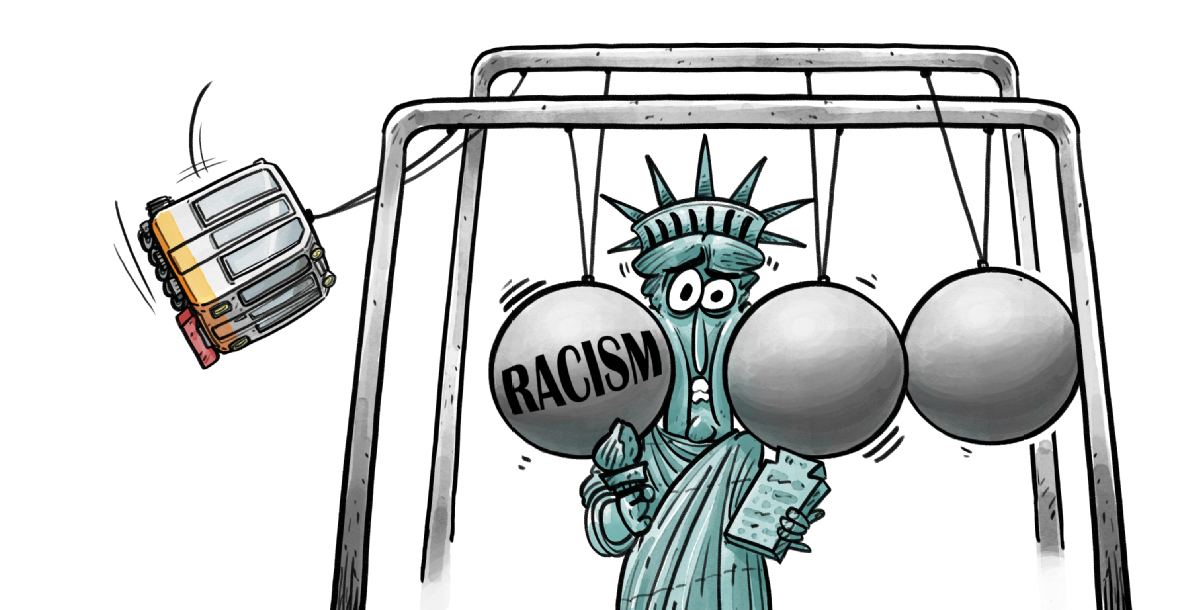Ignoring HK riots, US uses human rights to maintain hegemony
By Dai Ruijun | China Daily | Updated: 2019-11-06 07:48

What the United States can truly lecture other countries on is how to master the art of using double standard. On Friday night, several hundred protesters took to the streets in New York City to protest alleged police brutality. Yet on the same day, President Donald Trump tweeted: "NYC is getting dirty & unsafe again, as our great police are being disrespected, even with water dumped on them …"
So what makes the New York demonstration different from the Hong Kong riots for Trump? Why are the violent demonstrations in Hong Kong a pursuit of democracy and human rights, and Hong Kong police's efforts to restore order and protect Hong Kong residents' rights a suppression of democracy? And why do Western media outlets keep distorting facts about the Hong Kong Special Administrative Region while justifying police action in the US, the United Kingdom and Spain to deal with protesters?
Even more ridiculously, the US House of Representatives passed the so-called Hong Kong Human Rights and Democracy Act on Oct 15, linking Hong Kong's human rights and democratic conditions with the US' trade policy toward Hong Kong. Now the Senate is reviewing the act, through which the US Congress wants to interfere in China's Hong Kong affairs.
According to the act, if the US doesn't find the human rights and democratic conditions in the SAR to its liking during its periodical reviews, it could suspend its free trade agreement with Hong Kong.
The act is a ludicrous attempt to interfere in the internal affairs of a sovereign state. But then the US has always excelled in finding excuses to impose sanctions on other countries.
First, respect for each others' sovereignty and territorial integrity, and non-interference in other countries' international affairs are two of the basic principles of international law, which should be abided by all countries. But the US has always ignored international law as it considers itself the world police and self-appropriated the right to judge other countries using its own standards. Which makes the US an ugly global bully.
Hong Kong belongs to China. And the central government sticks to the promise of upholding the "one country, two systems" and providing space for "Hong Kong people ruling Hong Kong" and granting it a "high degree of autonomy". So, as an outsider, the US has no right to interfere in Hong Kong's affairs, and the passing of the act is a blatant interference by the US in China's domestic affairs.
Second, although the House passed the act in the name of human rights and democracy, the US doesn't really care about those values. Instead, it is using so-called human rights as a diplomatic tool to impose increasing pressure on China. The human rights advocated by the US is not the same as stipulated in United Nation's Universal Declaration on Human Rights and widely recognized by international community, but a set of its own principles. And since nobody knows what the standards of the US' human rights are, it could interpret them to suit its own purpose.
Third, the US act confuses right with wrong, and encourages the rioters in Hong Kong to commit even more heinous acts. The US legislation wrongly describes the rioters' violent acts as a pursuit of democracy and human rights, and Hong Kong police's attempt to restore peace and order in the city as suppression.
For several months, the demonstrators have run riot in the SAR, damaging public facilities, impeding public services, attacking Hong Kong residents and police officers and disturbing people's normal life, which in simple terms are an infringement on people's human rights and freedom.
The so-called Hong Kong act is another example of the US trying to impose its hegemony. No wonder the Foreign Ministry spokesman has said China will resolutely oppose US hegemony and make more efforts, along with other developing countries, to maintain a fair world order.
The author is a researcher at the Institute of International Law, Chinese Academy of Social Sciences. The views don't necessarily represent those of China Daily.
























